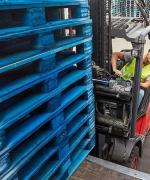
“This collaboration with CHEP makes Paulig the first company in Finland to use carbon-neural pallets in its operations. Using CHEP’s carbon-neutral pallets supports our work to reduce the greenhouse gas emissions in our supply chain. We share the values around sustainability and our collaboration will drive sustainable movement of materials and food products,” says Terhi Liukkonen, Paulig's Head of Indirect Sourcing.
Paulig operates in thirteen countries and it has production in Finland, Sweden, Belgium, Russia, Estonia and the United Kingdom. Coffee, spices and food products are exported to more than seventy countries.
Carbon-neutral pallets have a lower environmental impact
Through this collaboration, Paulig and CHEP work together to reduce emissions, the use of wood and the amount of waste. With the new pallets, Paulig will reduce its emissions annually by over 2 000 tonnes and save about 1 400 trees. Waste reduction is around 145 tonnes, which is equivalent of more than 13.2 million paper cups a year.
CHEP is a pioneer of the sharing economy and its circular business model perpetuates the share and re-use of the world largest pool of reusable pallets and containers. This minimises the impact on the environment and improves the efficiency and safety of supply chains around the world. In addition, all pallets are 100% sourced from sustainability forests and no waste wood or plastic is sent to landfill.
To enable the use of fully carbon-neutral pallets, CHEP offers its customers the possibility of compensating the annual carbon footprint derived from the use of the pallets, with the acquisition of carbon credits from Natural Capital Partners, which are then allocated to a chosen environmental project.
”Our credits will go to a project that aims to build water infrastructure in sub-Saharan Africa, because water plays such a crucial role in people’s well-being also in our origin countries,” explains Liukkonen. By providing clean water, communities no longer need to purify water through boiling. This alleviates pressure on local forests – the predominant source of firewood – and reduces greenhouse gas emissions.
Bold targets result in actions
A sustainable supply chain is an integral part of Paulig’s operations and a way to drive the future of food. Paulig is among the sustainable frontrunner companies in the food industry, and it has committed to set science-based climate targets in accordance with the Paris Agreement to limit climate warming to 1.5 Celsius. By 2030, Paulig aims to reduce greenhouse gas emissions from its own operations by 80 percent and its value chain by 50 percent. The aim is to get these targets validated by the Science Based Initiative in 2020.
Further information related to Paulig and interview requests:
Media@paulig.com
Piia Puska
Communications Manager, Paulig Group
Tel: +358 40 738 6086
piia.puska@paulig.com
